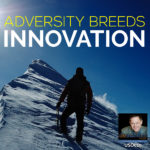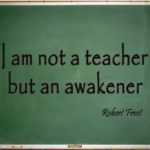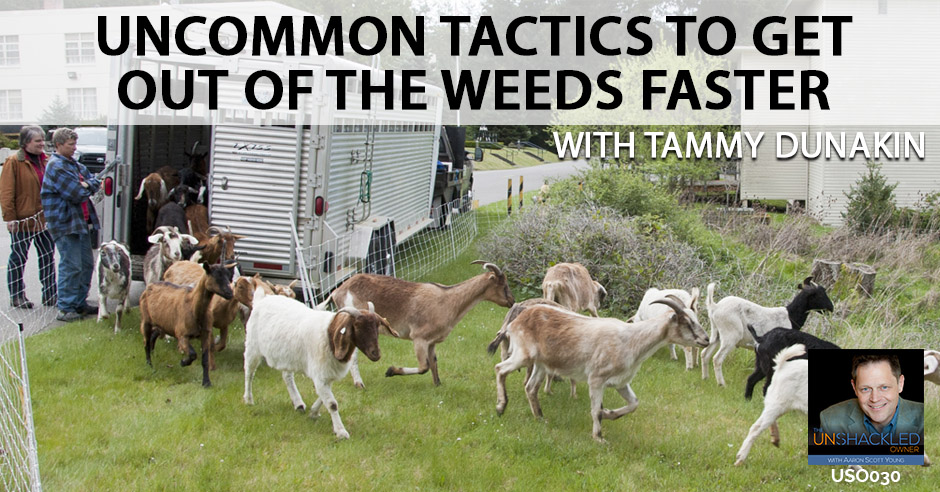
In this episode Aaron interviews Tammy Dunakin about how she transitioned her life from being a paramedic, to being a farm-entrepreneur. Starting with a few goats, she grew her herd into a thriving landscaping business and is now scaling her company by franchising throughout the country. Tammy talks about how hardships in her life led her to where she is now, living her life with passion and enjoying the life of an Unshackled Owner.
Listen To The Episode Here
Uncommon Tactics To Get Out Of The Weeds Faster with Tammy Dunakin
We’ve got another fun show in store for you. The thing we’re trying to do every week we get together is to give you ideas to think outside of the box, to give you the tools and the tips that you need to become unshackled. To not just be a slave to your business or to be an indentured servant to somebody else’s company, but to be able to finally find ways for you to break out and not just be in business but to own that business, not have the business own you, which is what we see with most entrepreneurs. Entrepreneurship is so critically important. The most recent information we have, 2015, 86% of gross domestic product was created by companies of 50 employees or less. 82.6% of all the new jobs were created by companies of 100 employees or less. What you’re doing, what my guests are doing, what I’m doing is vitally important to the country, to the economy, and to our local communities, and of course to our families. I’m excited for the conversation we’re going to have today with my guest.
My guest today is Tammy Dunakin. She owns Rent-A-Ruminant. If you don’t know what a ruminant is, a ruminant includes a lot of animals that you see as familiar like goats, but it could also be things like llamas and alpacas and other animals like that. Ruminants are very familiar at the Young Family Farm. We’ve been keepers of goats, llamas and alpacas over the years. What we’ve done though has been mostly for fun, for entertainment, for just the pleasure of being around these awesome animals. Tammy’s business, Rent-A-Ruminant, is all business. She probably has a deep affection for her employees. She’s been able to take something that is a love and a passion of being outdoors and being with the animals that she loves, with her dogs, and turn it into a viable business, not just a business that she can operate but one that even you could operate as a franchisee.
Tammy, it’s so freaking cool to have you here on the Unshackled Owner today. Thanks for being here.
Thank you for having us. It’s really fun for us, too.
The first I knew about you was when my son came back, he’s part of a film crew, and he came back from up where you live up in Puget Sound of Vashon Island, and said, “Dad, we were up and we filmed this super cool company. You’re going to love it.” Then we got online and saw some fun things including your feature on The Colbert Report where they talked about how your business was taking away American jobs from hardworking American people and giving them to these interloper goats. It was a very funny piece. Before we go into the whole Rent-A-Ruminant thing, I have to just find out. Did you grow up on a farm? Did you grow up in the city and longed for the outdoors? How did you even start down this path?
I grew up on a small farm, a little family farm. Prior to that, I was one of those horse-crazy little girls. It was so bad that I whinnied like a horse and loped around my yard like a horse and I played with only horse stuff. I had my little horse statue. I was obsessed with horses.
Did you have a horse?
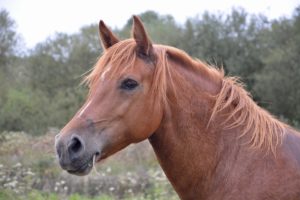
Get Out of the Weeds: At one point they went ahead and got me this one horse and her fold and they were completely wild.
Not at that point, but my parents finally caved. At one point they went ahead and got me this one horse and her fold and they were completely wild. It ended up being a rodeo but that started my life with horses. After a couple of years of having them and boarding them, they decided to buy a farm up in Marysville. We got a little ten-acre farm and I had my horses there and we had cows and chickens and ducks and geese and one goat at one point. It was just a fun little family farm but I was very committed to it.
I see and I meet, and it can be boys or girls but it does tend to be girls more than boys that go horse crazy. I love that. When our kids started with horses back twelve, thirteen years ago, when my son Max was ten years old, he’s 22 now, he’s the one who came to your place, and I just purchased a new horse, a Tennessee Walking Horse, and the people at this very successful show barn said, “Do you think your kids want to learn because for us to promote our horses, it’s wonderful if we have youth riders.” My two middle kids in particular really became super involved with the Tennessee Walking Horse world and went all over the country and showed horses all over the place, did great, and it really made them fall in love.
We did the same thing. We were boarding horses and we bought six acres. Now we’re on 25 acres, and we’re actually now building a house on 28 acres. Even though the kids are growing up, my wife who came from a small town America, Eastern Idaho, a little town of 3,000 people, she said, “You tricked me. I thought I was moving to Portland, Oregon. I thought I was going to the city. I was getting out of this village life.” Now that we’ve been out on the property, she’s like, “I could never go back to town.” She loves watching the goats. She loves watching the baby goats. Is there anything cuter than baby goats running around?
I don’t think there’s anything cuter.
There’s nothing more fabulous than baby goats that hop. They don’t run, they hop and the horses in the field and the chickens, and gathering eggs now with our grandkids. It’s such a joy. Tammy said her folks got a ten-acre farm and they were able to have horses, cows, goats and chickens. You can do so much on a little bit of land if you’re efficient and you’re a good steward of that land. You were this farm kid. Then you have had gotten to an age where you’re like, “I’m out of high school now. I’m going to go to college. I’m going to start a business. I’m going to go to work.” What happened to you when you got to the age where people expect you to leave the farm?
I had a rough patch because my mom got sick with breast cancer when I was about twelve and she died when I was sixteen. That really did a number on me. When she died, the light went out of me. I was really struggling to figure out what I wanted to do. I was doing horribly in high school because that’s not where my thoughts were. My thoughts were with my mom and taking care of her. At one point, I had this one teacher who taught our psychology class. He started our class that year doing affirmations. He had us write down on these little index cards things we didn’t like about ourselves. Then he had us change it to a positive. We were supposed to look at those cards several times a day and say them to ourselves. I glommed on to that for dear life because I was really having a hard time. One of the things I put on there is, “I want to be a 4.0 student, I am a 4.0 student, I have a lot of friends, I’m attractive,” all these things. By the end of that semester, I was a 4.0 student. My life completely turned around, still difficulties but I really saw the power of positive thinking. It set a course in my life. I wanted to go to college. What I wanted to do was take up where my mom left off when she went to college. She was going to be a physical therapist.
Let me pull you back. That’s such a good story and it’s such a classic story. You’re sixteen years old and your mom gets sick when you were twelve, there were four years of her getting better, getting worse, getting better, going through treatment, but finally she succumbs to this cancer, which of course obviously wiped you out. Were there other children in the family?
I was the youngest. My sister was in her twenties and my brother was four years older than I was, so he was in his early twenties. I was left alone after that.
You were there by yourself in the house with you and your dad and your mom.
Yeah and he was never home. I just went from having a family to being all by myself. It was very difficult. I really had to make the choice of whether I wanted to continue on in this world at that point.
A lot of people who go through something so tragic, especially young when you don’t have a lot of context for how much life is ahead of you, that would be a very heavy burden to bear. Your older sister and your brother, by the time you’re sixteen, they’re probably more or less out of the house. Your dad’s busy all the time. Did they sell the farm or did you move into town? What happened?
He kept the farm. My relationship with the farm really started to fall away because I didn’t have the energy and it was such a reminder of my mom. It was sad. My horses just hang out in the field and I just stopped doing all the things that I had done before after a period of time. I still would go out and take care of the animals in the morning before I went to school and get called because the cows were out and I’ve got to go home and put them in.
I don’t mean to go too far off because I want to get to your physical therapies for a bit. Sometimes when you’re really low, when you’re really, really down, one of the best things you can do is go out with those horses. It’s scientifically proven. We, as human beings, this is the truth, our heart muscle actually puts off energy about eight feet away from our body. When you walk into a room and you have this, “I don’t like where I am,” or, “This feels great to be here,” a lot of times that’s because there’s good energy that’s being telegraphed off of other people’s bodies. Horses’ heart energy extends about twenty feet. I’ve heard a lot of people who’ve gone through health problems of their own through family death situations or other kinds of loss and who have horses, and they say that actually going out there just feeding them, taking care, standing around near them, you know how a horse when it puts its head up on your shoulder, there’s something about it that you can’t get from a chicken, even from the goats.
You’re going through a hard time, you finally got time to leave, high school wasn’t great but you went on to follow in your mom’s footsteps or do what she had gone out to do, which is to be a physical therapist. What happens there?

Get Out of the Weeds: I dropped out of school because I felt like I was wasting my dad’s money and I got conscience about it.
I started college at Washington State University. Unfortunately, a few years prior to this, right about the time my mom died, I developed a relationship with alcohol. It was not friendly. I went to a party school. I ended up squandering my education on playing soccer on a team and partying. I blew it and I ended up dropping out after two years. There was a lot of weird stuff in that day and age. It’s the year when Mount St. Helens blew. Before that, we had a young kid who had actually blown himself up in my dorm with dynamite and John Lennon died. It was just weird. It was just an odd time. I didn’t like being away from the water. I’m really used to being around Puget Sound. I dropped out of school because I felt like I was wasting my dad’s money and I got conscience about it. I went back to live with him for a little while, decided, “I’m going to join the military.” There’s a whole story about that. I ended up joining the military but then unjoining the military before I actually went to boot camp, which there’s a whole story behind that but then I won’t go into.
You were looking for direction. You were trying to find some place.
I was really looking for something. I went out and I decided I needed to be more worldly, so I started working. I became a bus driver for Metro for a short time. I did all this little weird moped delivery service in Downtown Seattle, all this stuff. Then I went and worked on a boat for NOAA out in the middle of the ocean.
For the weather research?
Yeah, on one of their ships. It was when I was on one of those ships that I had an a-ha moment that guided me to my next phase in my life and to my first real career. That a-ha moment was I decided I wanted to go into medicine but I didn’t want to do physical therapy. I wanted to do something that was a lot more exciting. I drifted towards emergency medicine and what I decided in that moment was I’m going to be a paramedic. I literally said that to myself, sitting on a deep sea winch at 3:00 in the morning looking at this light bulb and I went, “Oh.” I came back from that. I jumped ship after a month because I hated it. I also read the book The Hundredth Monkey on that boat and it really spoke to me.
I came out of that and had a small stint doing peace activism. I was a peace activist for a while. Then I said, “I’m really going after being a paramedic.” I started from scratch. I had to first get my First Aid card. Then I had to become an EMT. Then I had to work as an EMT for a while before I could even think about becoming a paramedic. I wanted to work in the Seattle Paramedic System, which is the best in the world, so I set my sight. In a couple of years, I was there and working in King County for King County Medic One, which is part of the Seattle training system. It was great and it was interesting because I realized that job, after the fact I did it for ten years, I really needed to be able to save people’s lives, and that was because of losing my mom. It was another a-ha moment. That was the next phase.
That was some time in the early to mid 90s and you’re a paramedic, you did that for a while and you loved it. So many people that I meet out there, they start a non-profit organization because they were sexually abused or because somebody died. They’re trying desperately to heal themselves and they think, “I don’t want anybody else to feel as bad as I felt. What can I do to help people never have to feel like I felt?” In your case, you thought, “How can I save lives? I lost it, how can I save?” Going from peace activist/paramedic/moped delivery service, what was the moment where you said, “I think I’m going to go get a bunch of goats?”
I had a small farm. I was living in Vashon Island and I had a little seven-acre farm. I had two goats at the time.
Tell us about Vashon Island.
Vashon Island is a little island that’s in Puget Sound and it’s right off at the tip of West Seattle, between Seattle and Tacoma. You have to take a ferry to get on or off the island, so it’s very rural and it’s a throwback. You go there and you feel you’ve gone back twenty years. It was a big hippie commune back in the day. It’s just a really cool place, really neat people that are there. I just fell in love with it when I first found it. When I was able, I bought property there, and I made this little farm. I had a couple of horses. I got back into horses again. I had a pet pig named Wilbur who weighed 800 pounds, and I had a couple of dogs and cats and my two goats.
I had to stop being a medic because I ruined my back and had a few surgeries and couldn’t continue to do the work as a medic and have bad knees too. I was working at Harborview Medical Center up here, which is our level one trauma center. I tried to be an entrepreneur. I opened up a little shop on Vashon called Sun and Spirit. It was a little tanning booth/tattoo parlor/metaphysical art shop. It didn’t do well. I had to go back to work. I went back to Harborview because that’s where I trained and I was comfortable there. I worked in the ER for a couple of years. Then I burnt out on that really fast. Then thinking it would be a little easier, I went up to the Burn ICU and did that for two years but I didn’t realize I would be doing wound care all day long on burned patients. That really sucked the life out of me and I was starting to lose my ability to feel compassion. I knew that’s what happened at the end of my medic career as well and I went, “I need to get out of this.” I didn’t know what I was going to do. I worked for the fire service as a medic, working 24-hour shifts, and then I worked shift work at the hospital doing twelve-hour shifts. I was really used to not working 9 to 5, Monday through Friday. I could not imagine going back to that. I thought it would just kill me.
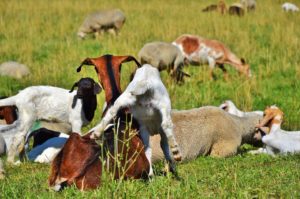
Get Out of the Weeds: I walked out to see my goats, I looked at them and I said out loud, “You guys look really bored. You need a job.”
When I was at Harborview, one day I went home and I walked out into my pasture. This is true. I kid you not this is exactly how it happened. I walked out to see my goats, I looked at them and I said out loud, “You guys look really bored. You need a job. I’m going to start a business. I’m going to call it Rent-A-Ruminant and I’m going to hire your little butts out so that you’re not bored and to give me a new career.” I laughed out loud and thought, “That would cool.” I told people about it and they laughed and then they’d say, “That’s a really good idea.” I thought I invented this thing in my mind and I thought, “That would be a really cool thing to do.”
Fast forward, I was in a coffee line, a couple of years into it, I’m standing there and I’m going, “I can’t figure out what I’m going to do and I got to quit this trauma. I can’t do any more trauma. I’m just done with trauma.” A question came into my mind and it said, “What is it you wanted to be when you were a kid?” All the sudden, I went, “I wanted to be a farmer.” On the heels of that, Rent-A-Ruminant popped back into my head and I thought, “That’s what I’m going to do. I’m actually going to pursue this and make this a business.”
It was somewhere in ’04 that you said this is what you’re doing.
Yeah, that’s when I decided I was going to do this thing.
Did you go out and buy a whole bunch of goats? Let’s talk about the general premise of the business. You take goats into areas that might be otherwise difficult to clear brush from. Is that generally the idea?
Yes.
The goats can work up and down steep hills or get into all the thick sticker bushes like blackberries and so on.
Exactly.
Somebody says, “We’re going to do this.” You decided to do it. How many goats did you start with?
About six to ten.
You’ve got a small herd.
I have absolutely no idea what I was doing and I was not the kind of person that would research things. I’m a very much ‘go by the seat of your pants, just do it kind of person.’ I just did that and I would not recommend that for people.
Have a plan. Have a system. The listeners all know that I’m always talking about begin with the end in mind. If you have a system, if you know your outcome that you want, you get to it much, much more quickly. Tammy is describing experiencing the classic entrepreneurial mistake of, “I’m just going to go do it.” When you started, what was your first hurdle that you ran into?
It was a cluster. I didn’t know how to fence them in. I didn’t know what was out there to fence them in. I was schlepping around these big hog panels and big heavy T-posts.
Hog panels are 16 feet long and about 3.5 feet high, but they are a heavy panel that changes in how far apart the cross members are. They are these rigid welded together panels that you can buy at a farm store. With a T-post you can stand them up and you can quickly put together temporary fencing. It could be more permanent if you have hogs and you’re trying to make a pen for the pigs because the pigs can’t jump over this thing. Hog panels for goats, a good idea unless they really, really want out.
Nothing stops goats if they really, really want out. I just did the hog panels, which were really heavy. The ground was so hard I couldn’t pound the posts on without basically pounding my brains out at the same time with that post pounder. Then I thought I had the bright idea of thinking I was doing around these old greenhouses that were completely overgrown in between with blackberries, impenetrable. I thought, “I’ll fence off the front and then the greenhouses are blocking them in their spot in these rows. There’s no way they can get through 50 feet to the end of that. It’s impenetrable.” The first thing I do within the end of day one, I got a call from the people who were letting me do this as a trial that the goats were out. They just crawled through and did exactly what I thought they were not going to do.
Goats can get through some crazy thick brush. You’re learning quickly.
I learned quickly. I then went out and go, “Before I can do anything, I have to be able to fence these animals in or else I don’t have a business.” I actually got online and researched and found out there’s actually this thing called an electrified netting that is portable, you roll it up, it’s got the post in it, and you take it around. I ended up getting some of that and then I had to figure out how to use that, because there’s a learning curve to that. They jumped out on multiple occasions because I didn’t do it right because I don’t like to read instructions either. I just get it and of course just do it.
I made every mistake you can make, but over time, I started to figure out system, just like you were just talking about. I started figuring out, “This is how you do this.” It was a process that was grueling and extremely difficult and probably cost me a lot more money than it should have, and it gave me the heartbreak that I didn’t really need to have and money loss that I didn’t need to have, had I done starting business correctly.
Tell us a little bit about who do you go out and do this work for now and how has your herd changed? Give us an idea or a snapshot of if we saw it today, if we came to visit you on Vashon Island.

Get Out of the Weeds: Now I work almost exclusively in cities and suburbs about a 40-mile radius of Seattle.
First off, I really don’t work on Vashon anymore. I did that for the first two years until I got it down enough that I could take on the big city. I started getting calls from Seattle. Now I work almost exclusively in cities and suburbs about a 40-mile radius of Seattle. I hit the road running in April and don’t see home until the end of October. I’m pretty much an urban nomad, just going from job to job with usually 120 goats, 60 to 120 is what I use on a job, and my herding dogs and my livestock guardian dog, my trailer that I sleep in, my little travel trailer, and my livestock trailer. That’s my life.
You have two people driving?
No, it’s just me. It’s all been me, me and me this whole time.
What’s interesting is in the iteration of you that we’re talking about, you are a shackled owner.
I am a shackled owner.
It doesn’t happen without you there. Just for giggles, I want to ask, what kind of herding dogs do you use?
I have a Border Collie and an Australian Kelpie.
The reason I asked is because we have Australian Shepherds on our place, but I really thought about adding a Kelpie. Border Collies are a little too wound up for my taste, but that’s okay, they’re fantastic dogs. They say you need one of each because you need one that works the outside and one that goes in if you have cows or goats.
I pretty much just use my Border Collie because my Kelpie is a little too aggressive.
The Kelpies in Aussie, they go in and they nip at the feet, whereas a Border Collie is famous for just staring the animals down. They have this great eye that they just focus on and it intimidates the cow, the sheep, the goat, and they just move them gently the way they want to go. I wanted people to know that about how you handle 60 to 120 animals. Then you have a Great Pyrenees or what kind of guardian dog?
He’s a mixture of an Akbash and a Komondor breed, beautiful dog.
Komondors have the curly hair, don’t they?
He doesn’t though, thankfully. They look like a big sheep, but he’s gorgeous. He’s just a big gray tall guy. He’s a really cool dog.
He keeps any predator or person away from those animals?
Yes, he does.
If you’ve never been around a 125-pound livestock guardian dog, they don’t have to do anything except for just walk toward you and you will turn around and leave their area. There’s something about something that big, doesn’t have to growl, doesn’t have to bark, it just walks toward you. It’s an incredibly intimidating moment. We’ve had Great Pyrenees at our place over the years. These dogs are never meant to really be pets. You can make them a pet but that’s not what they’re designed for. They’re barkers but with people they’re just quietly or non-aggressively but intentionally move you away from their charges. They’re going to protect those animals. You are out there on the road, moving around, you come on to some work site. Did the dogs hold the goats in place or do you have to fence every time?
Yeah, I have to fence. Picture Downtown Seattle just below the Pike Street Market, the Alaskan Way Viaduct on the hillside there. That’s the situation I’m working in, super urban. We have to fence them in with the electrified netting and/or if there’s existing fence such as a chain-link, I can use that. However, goats being goats, they can get out of just about anything. Chain-link is not as great as deterrent from them escaping as you would think. They just beeline for it. It’s like they have a sixth sense about where the hole in the fence is that you can’t see that’s behind 20 feet of blackberries or whatever. They know and they go for it. They will find it.
How did Stephen Colbert find you to put you on the show?
I don’t know. They just called me up, which is how it always happens. Every big news thing I’ve done, Colbert and Newsweek and Nightline and all that, they come to me. People love the name of my company. I enjoy doing interviews and I’m pretty animated and passionate about what I do, so I think I do a fairly good interview and people are drawn to that.
You go back out and you set up your netting and you put the goats out. Do you stay right there with them?
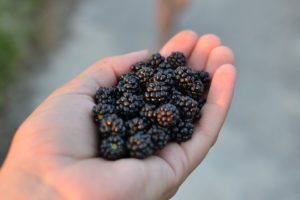
Get Out of the Weeds: I go out and cut down vegetation that’s too tall for them to reach. I’ll cut off remnants of stuff like the Himalayan blackberries.
I’m on site with the goats 24/7. I’ll leave to go get coffee or to run errands or sometimes I have to run back to Vashon to get my mail or something, but I live on site and oversee them. It’s not like I’m just sitting around eating bonbons all day when they’re out working, I’m not. I go out and cut down vegetation that’s too tall for them to reach. I’ll cut off remnants of stuff like the Himalayan blackberries. They eat a huge amount of the biomass but they don’t eat every single piece and they don’t eat the largest part of the cane. I try where I can cut off as much of that as I can at ground level so that it looks better and slows the regrowth. I like it to look clean as I can when I leave.
You’ve got this all figured out. I know that now you’re beginning to promote franchises and when I look at your website, it talks about Tennessee and Texas, as well as the state of Washington where you live.
I just got North Carolina too.
That’s where you have franchises now, in Texas, Tennessee and North Carolina?
Yeah.
Tell is briefly, what would be the disposition of somebody who’d want to be a goat wrangler brush-clearer? Is it going to be better if they already have some idea of herd health and managing dogs, or is that something you can teach them from the ground up? If somebody’s fed up with their sales job or their school teaching job and they want to go do something like this, how does this translate?
I set up a licensure about six years ago and I brought on about twelve licensees. It’s not my first foray into getting other people going in the business. I cut my teeth on that and learned how to put together systems for people to learn from and to teach it and how to support people. I bring in everybody from the social worker who works at the needle exchange and has a cat and lives in the city and wants to reinvent their life, to the person who has a herd of goats and maybe they’ve been in the dairy industry or the meat goat industry or something and they’re just not happy with it. They want to get going in the goat rental business and they want somebody there to help them that can mentor them and train them and support them, hold their hand to get them going and teach them what it is they need to do and what it is, probably most importantly, they need not to do. I get everybody. I really get the full gamut of people that want to do it. I can do either one as far as getting them going goes.
You’ve lived such an interesting and varied life, and of course you work with animals, you work outside a lot which tends to make people even more wise when it’s not just selfish. You’ve got another 125 bodies that you’re taking care of besides your own and you can’t help but gain some wisdom from that. First of all, is there a book or some educational thing that you really recommend either for people who want to learn about your business or that’s helped you in your development as a person or as a business owner?
I’m not a huge reader, but if you ask me that question, the book that pops into my mind regarding business is Think and Grow Rich. I can’t tell you why now because it’s been a long time since I read it, but it really made an impression on me. Also, Viktor Frankl’s Man’s Search for Meaning. Those are two biggies.
If you’ve never read those two books, get on Amazon and order them. Frankl’s book about living in the concentration camps and surviving that during World War II, and then of course basically what’s the number twelve book of all time, Think and Grow Rich, absolutely must-reads, both of them. Those are great ideas. I love hearing people that have a favorite quote or a favorite song lyrics, something that resonates with them. It gives us a little bit of a peek behind the curtain at what it is that drives you or inspires you. Do you have something like that?
Yes, I do. It’s, “The definition of insanity is doing the same thing over and over and expecting different results.”
If you have never raised animals on a farm, you don’t even know there’s so much meaning to that your whole life, but when you’re dealing with animals, you keep trying, “I’m sure this fencing should work,” but then the neighbors are calling. You told a lot of interesting stories that brought you to this place. Is there something in your business life, let’s keep it to that, it could be a personal decision too, but something that you wish you could go back and re-do that or make a different choice, take a different path, what cautionary counsel can you give to the listeners?
I’ve already said it I think. If you’re going to start a business, it’s really important to do your due diligence on what you need to do to start that business effectively to be successful. Doing it like I did, by the seat of my pants with no knowledge and just learning as I went along, you can do it but it makes the journey take a lot longer to be successful.
What’s your advice then as far as mentorship? It could be taking a class. It could be somebody who’s been down the road before you that’s teaching you specifically.
The classic one right there, having somebody like myself to guide you in the process and help set you up with the things you need and the systems, all of that, to be able to do it successfully from day dot. I think that’s a biggie.
You’re right. It leads perfectly into this idea of franchise which is established systems. In your case, it should be how to get clients, how to contain the animals, herd health. There would be so much there that somebody who just wanted to say, “I can go get a bunch of goats off of Craigslist or something and go into this business.” You have no idea the complexity of what you’re getting into and especially you’re dealing with animals, your workers. If you get a disease or an illness amongst them, they could all die very quickly. You’ve got to be a really good steward. No matter what your business is, be a good steward of it. The way to avoid the pain and the misery and the cost is get a mentor or get a system that’s already proven. Tammy, is there any parting words of knowledge or wisdom you’d like to pass on to people as somebody who’s been through and seen so much life? If they want to get a hold of you, what’s the best way to reach out to you?

Get Out of the Weeds: If you set your mind to it and commit, there’s really nothing you can’t achieve.
My parting message would be the world is your oyster. If you set your mind to it and commit, there’s really nothing you can’t achieve. Realizing that they’re not trapped as trapped as they feel they are in their life, that there’s always something different if you’re willing to step outside the box and take a chance and take risks, it opens up a whole new world. It makes life a whole different experience than when you’re beholden to the man as so many people are in their day-to-day lives. Find something you love. This is what I love, I love my goats. I have a no slaughter clause. My goats are with me until the day they die from natural causes. I get the old goats home on my farm. I’m committed to them 200%. If they’re not happy, I’m not happy. Find something that you love that makes you happy.
How can they reach you?
The best way to reach me is to go to my webpage and fill out a contact form. My webpage is RentARuminant.com and you can also email me at Info@RentARuminant.com.
To the listeners, explore this. If there’s anybody who’s going, “I am so burned out. I want to just hear a different story. I want to hear something.” Just see how you can go from working on a semi-government ship to being a paramedic to working in a major medical center to taking your goats out to eat down the brush along the freeways and other places that are difficult for humans to get into. You can do what you want. Tammy, thank you so much for being with us today. It’s been a real pleasure.
Thank you. It was definitely fun.
I want to echo this idea that the world is your oyster. We’ve heard it so many times, it can become cliché. Why do we talk about the world is your oyster? The oyster is this hard on the outside thing that’s very difficult to open up. It’s not a piece of cake. It’s not picking an apple from a tree. When you open up that oyster shell, not only is there good quality eating in there but there could be a pearl. You don’t know what awesome opportunities right around the corner from where you are. It takes some courage, it takes some risks, but there is no reward without risks. If you want to become an unshackled owner, you don’t want to just take risks but you want to get some guidance, you want to get some direction, you want to get some mentorship, you want to follow proven systems like Rent-A-Ruminant franchise can give to you, like the Unshackled Owner program can give to you, like so many other things. You just have to find, “How can I do this in a way without having to reinvent the wheel?”
If you want to become one of us, if you want to become an unshackled owner, reach out to me, aaron@AaronScottYoung.com. Join us again next week. We’ll have more great information for you. Go ahead and like us on iTunes and write a review and share with your friends. Let’s get this information out to as many people as we possibly can so we can help as many people be successful out there in their business as possible. We need small business owners in the community, that’s the message today right here on the Unshackled Owner podcast.
Links Mentioned
- The Colbert Report
- The Hundredth Monkey
- Harborview Medical Center
- Rent-A-Ruminant
- Think and Grow Rich
- Man’s Search for Meaning
- Info@RentARuminant.com
- AaronScottYoung.com
- The Unshackled Owner Twitter
- The Unshackled Owner Facebook
- Aaron Scott Young LinkedIn

